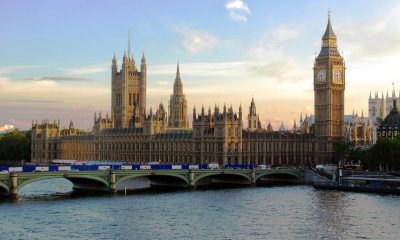News
How Trump’s plan to pay for Mexico border wall would work

President Donald Trump (Pictured) is promising Mexico will pay for his massive border wall. On Thursday, his administration finally suggested how: a 20 per cent tax on products imported from south of the border. (Photo: Donald J. Trump/ Facebook)
WASHINGTON –President Donald Trump is promising Mexico will pay for his massive border wall. On Thursday, his administration finally suggested how: a 20 per cent tax on products imported from south of the border.
The new measure could be part of a comprehensive tax reform package that Trump and Congress will work out, the White House said. But there was great ambiguity about the proposal. White House officials later clarified that the tax was but one possible way Trump could finance the wall.
Much was left unanswered. Would Mexico be footing the bill or American consumers? What items would become more expensive? Is this even legal?
Some of the details Trump’s proposal still has to work out:
IS IT A TAX, A TARIFF OR SOMETHING ELSE?
It’s unclear.
The White House said Congress’ tax overhaul would place a 20 per cent tax on imports from any country enjoying a trade surplus with the United States. In other words, countries selling more goods and service to the U.S. than buying from it. The idea is to rebalance the playing field for U.S. companies by discouraging Americans from importing.
The idea appears to overlap with a plan House Republicans are pushing called “border adjustment.” Under this plan, the U.S. would refrain from taxing American companies’ exports, but would tax imports.
The new revenues are projected to top $1 trillion over a decade. The money had been envisioned as an offset for lowering U.S. corporate income tax rates, though House Republicans say it could also pay for a wall.
Trump, however, recently said he didn’t like the “border adjustment” idea.
WHAT DOES THIS MEAN FOR AMERICANS?
Mexican products would become more expensive.
That means pricier tequila, but also things Americans need: cars, eyeglasses and many basic groceries.
A Toyota Camry? About $1,000 more, according to Jim Lentz, CEO of Toyota North America, noting that a quarter of the car’s parts are imported.
U.S. exporters are behind the House plan because it would reduce their taxes.
Here’s the flip side: Importers, including big retailers and consumer electronics firms, say the higher prices for Mexican products could hurt sales. And that means American jobs.
Retailers such as Wal-Mart also could face higher tax burdens.
WOULD MEXICO REALLY BE PAYING?
Not quite.
The U.S. could recoup some of the wall’s costs by changing the tax and trade policies with Mexico. But the money wouldn’t necessarily be coming from Mexican taxpayers or the Mexican government.
While the tax would land first on companies exporting from Mexico, the costs would likely be passed on to consumers. That leaves Americans footing much of the likely bill.
Trump has said he’s OK with being “reimbursed” at a later point because he is keen to start building the wall immediately.
WOULD IT RAISE ENOUGH MONEY TO PAY FOR THE WALL?
Probably.
Various estimates put the wall’s cost at up to $15 billion.
House Republicans expect their plan to pull in much more than that in its first year. They say that could easily cover the costs of the wall.
IS IT LEGAL?
To be determined.
The U.S. has a range of obligations under the North American Free Trade Agreement and at the World Trade Organization. And Mexico is likely to challenge any new tax that penalizes its economy.
Trump has said he plans to renegotiate NAFTA. Mexico, however, is under no obligation to soften the agreement for his sake.
Other countries may also object, if their products and services are targeted.
Mark Zandi, chief economist at Moody’s Analytics, said the border adjustment is essentially a tariff that would be struck down by the WTO if it targets Mexico.
HOW WOULD THIS AFFECT THE ECONOMY?
A topic of great dispute.
The White House said the plan would increase U.S. wages, help U.S. businesses and consumers, and deliver “huge economic benefits.” With so much of the plan ill-defined, it’s impossible to substantiate those claims.
Any turbulence in the U.S.-Mexican trade relationship could have implications for the entire world.
Mexico is the second-largest exporter to the United States, after China. The United States imported roughly $271 billion of goods from Mexico during the first 11 months of 2016, according to the Commerce Department, and ran a trade deficit of almost $60 billion.
DO REPUBLICANS LIKE TRUMP’S PLAN?
Not all of them.
Rep. Justin Amash of Michigan said on Twitter it would be a “tax on Americans to pay for the wall.” Sen. Lindsey Graham of South Carolina said he was “mucho sad” and that “any policy proposal which drives up costs of Corona, tequila or margaritas is a big-time bad idea.”
Even Trump’s pick for commerce secretary, Wilbur Ross, dismissed the idea of using tariffs as a trade ploy.
Republicans have traditionally hailed themselves as the party of free trade.
WHAT OTHER WAYS COULD TRUMP GET MEXICO TO PAY?
During the campaign, Trump floated a number of possibilities without committing to any in particular.
He proposed changing a rule under the USA Patriot Act to block some of the roughly $25 billion in remittances that Mexicans living in the U.S. send home each year. He said he would refuse to free up the money until Mexico agrees to pay the U.S. between $5 billion and $10 billion.
Opponents of that plan say Mexicans in the U.S. would likely find other ways to send money back. They could take cash with them when travelling, wire money to a non-Mexican bank or use off-the-books transfers that are difficult to police.
Trump also suggested increasing visa fees for Mexicans to raise money, or cancelling business and tourist visas issued to Mexicans until their country pays for the wall.





















